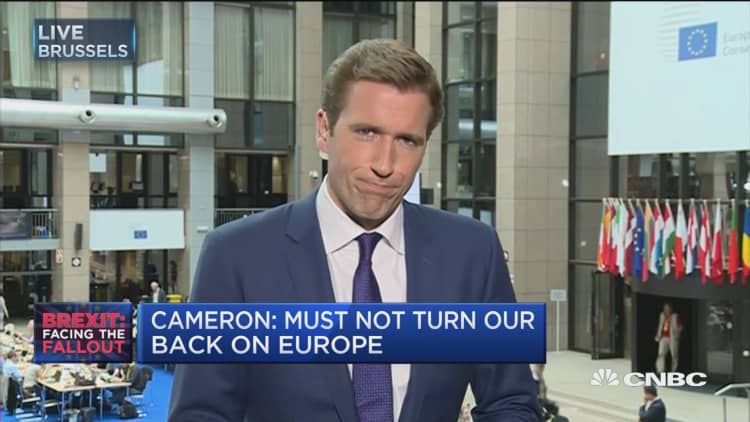
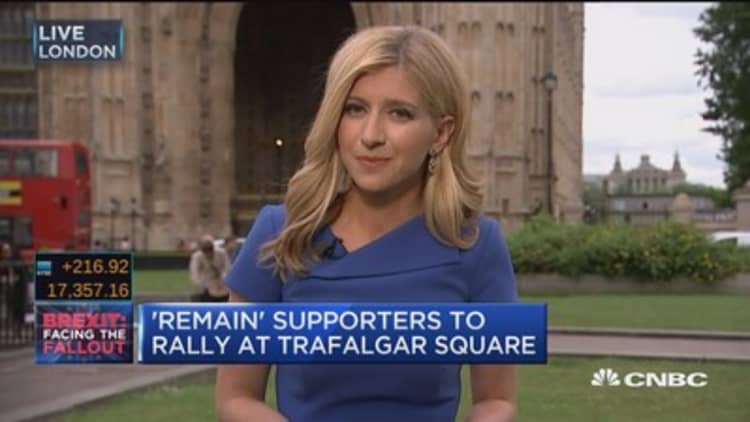
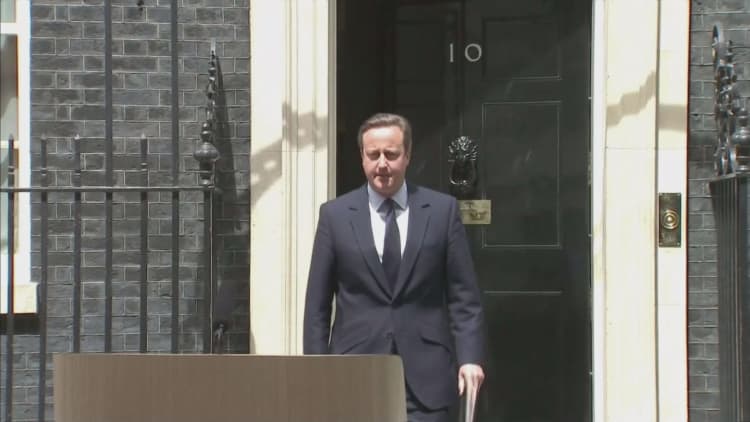
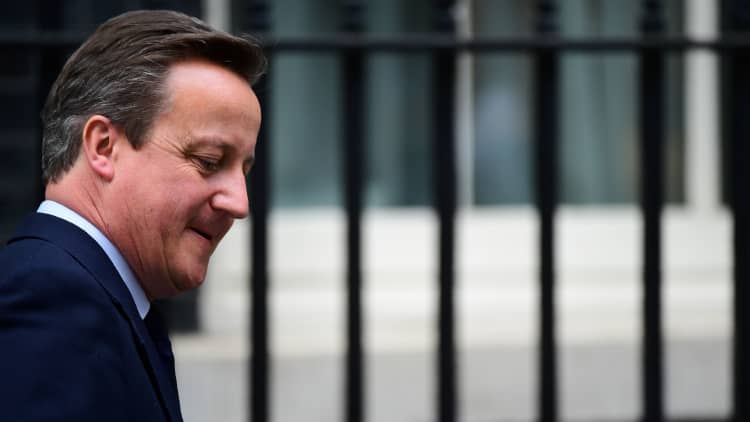
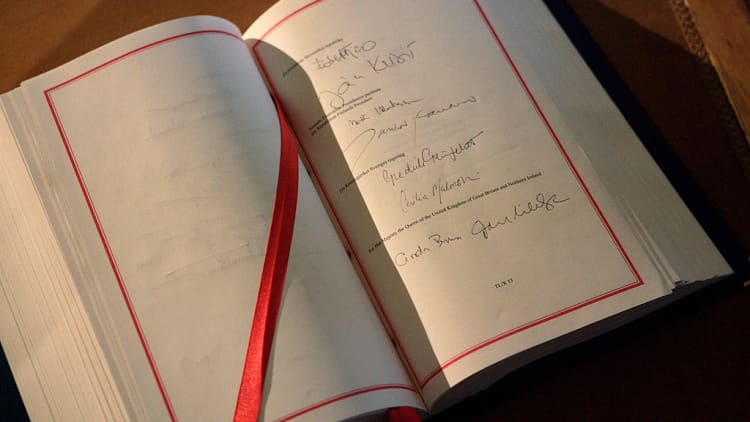
Outgoing U.K. Prime Minister David Cameron is attending a European summit in Brussels on Tuesday where pressure is expected to be applied on the U.K. to trigger Article 50 to start the process of leaving the European Union (EU).
EU leaders are expected to debate the U.K.'s decision last Thursday to leave the economic and political bloc made up of 28 countries, which has prompted turmoil in global markets and crisis in the political establishment, both in the U.K. and EU.
However the U.K. has yet to trigger Article 50 which begins the leaving process despite calls from other EU leaders to do so – meaning that the summit could be acrimonious.
Cameron said he wanted a "constructive" divorce from the EU on arrival in Brussels.
"Britain will be leaving the European Union but I want that process to be as constructive as possible and I hope the outcome can be as constructive as possible," Cameron said.
The U.K. has said it wants to know where it stands with the EU before triggering the untested procedure. The prime minister resigned on Friday following the Brexit result and said he would stay on until a new leader is elected to oversee the Brexit process – now expected to be in September. Only then, he said, would Article 50 be enacted, triggering a withdrawal process that can take up to two years.
With the exit procedure postponed, EU leaders are in no mood to placate the U.K. or rush to the negotiating table. Many are not happy with the delay in triggering Article 50, fearing that it will prolong uncertainty for the European economy and political establishment that is already facing a rise in populism and anti-EU sentiment.
On Monday, German Chancellor Angela Merkel met with her French and Italian counterparts, Francois Hollande and Matteo Renzi, and European Council President Donald Tusk in Berlin. Presenting a united front, the leaders said the EU now needed to focus on strengthening its economy, jobs and security. They also reiterated that there would be no "formal or informal talks about Britain's exit" until Article 50 (an untested procedure) is enacted.
As such, Cameron – despite having campaigned to stay in the EU – headed to Brussels with few friends to call on for support although Merkel, a leader known for her pragmatism, has called for calm. She said last week that there was "no need to be particularly nasty in any way" in any forthcoming negotiations over an exit.
Awkward dinner date
Whether the atmosphere will be cordial at Tuesday's summit of the European Council is uncertain. Cameron is expected to explain the country's position during a working dinner of the 28 heads of state before an exchange of views, before heading back to London.
On Wednesday, the other 27 member states "will meet informally to discuss the political and practical implications of Brexit," Donald Tusk, president of the European Council, said in a statement.
"First of all, we will discuss the so called 'divorce process' as described in Article 50 of the Treaty. And secondly, we will start a discussion on the future of the European Union with 27 member states," Tusk said.
Carsten Nickel, deputy director of research at risk consultancy Teneo Intelligence, said on Monday that Germany appeared to have aligned itself with France's more "forceful approach" and Cameron shouldn't expect a warm welcome.
"Merkel will have to find a middle way that reflects a broad array of European member states' interests, including more hawkish views. Recall that many European leaders find themselves under domestic pressure from Eurosceptic forces, most notably, France. These governments will have a strong interest in negotiating hard with the U.K., to convey to their own voters that any flirtation with anti-EU forces has negative consequences," he said in a note.
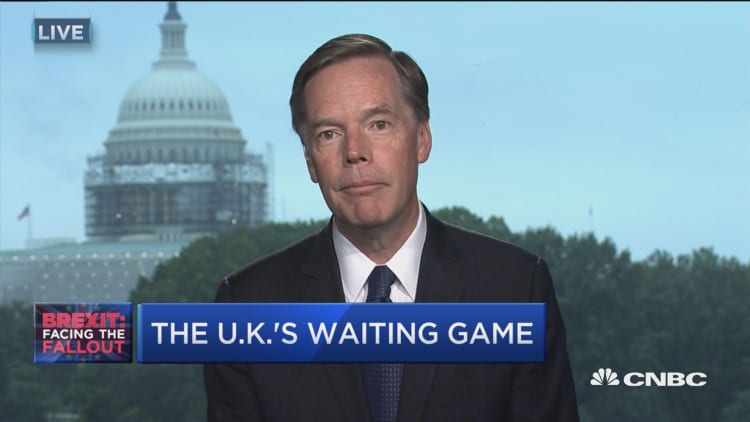
Despite the hard line being taken with Britain – EU leaders want to deter other countries from following the U.K.'s lead – there is widespread regret at the decision by almost 52 percent of Brits to leave the Union.
The result was called a "sad day for Europe" by Germany's foreign minister, a sentiment generally echoed by other leaders and on Monday. European Central Bank President Mario Draghi expressed "sadness" at the result.
Firefighting
At home, Britain's politicians are largely firefighting the political and economic uncertainty that the vote has unleashed. As well as the question mark over the next leader of the Conservative party (and whether he or she will be from the remain or leave camp) there is a growing revolt in the opposition Labour party with a large number of Labour politicians calling for Jeremy Corbyn to resign.
That's not to mention the ructions in largely pro-remain Northern Ireland and Scotland, threatening the makeup of the U.K. itself, and widespread protests from the 48 percent of voters who wanted to remain in the EU. And in the meantime, the U.K.'s credit rating was downgraded by Standard and Poor's and Fitch on Monday, one of many signals of rising concern over the U.K.'s outlook.
Teneo Intelligence's Nickel said that whenever talks with the EU begin, the leader overseeing the U.K.'s position will have a hard task negotiating amid a backdrop of political uncertainty at home – including the possibility of an early general election.
"The structural political conflict remains unresolved: how far will the new PM be willing to go in terms of striking compromise on the migration front so as to maintain broad access to the EU's single market? This question is unlikely to be answered anytime soon and will continue to be a source of considerable uncertainty for investors in the U.K. going forward. While an immediate turn to snap polls appears unlikely at this point, the linkage between migration and access to the single market will create considerable political risk over the course of the upcoming negotiations," he said, adding that "the only upside for the government of outgoing PM Cameron is the deplorable state of the opposition."



